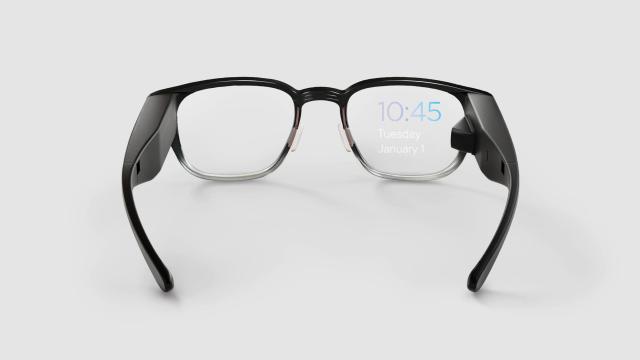Tough times seem to keep rolling for makers of augmented reality glasses. North, the Canadian startup behind the consumer-focused Focals by North smart glasses, is in the final stages of a $US180 ($262) million sale to Alphabet, according to a Globe and Mail scoop.
Citing anonymous sources, North is essentially being “stripped for parts” and that Alphabet views the acquisition as an easy way to potentially re-enter the consumer smart glasses market for minimal effort or cash. Part of the problem appears to be the company botched rollout of its Focals by North product. Despite its patents and team of talented engineers, the company hadn’t worked out kinks in its custom fitting process.
The Globe and Mail reports that the company struggled to fit Asian and Black customers, as their “facial structures did not always match sizes North made available.” Likewise, there were problems fitting people with longer eyelashes and the company purportedly had issues with quickly fitting the glasses with prescription lenses. The report also cites an unnamed source as saying executives were aware of this problem, noting that about 20% of people “simply couldn’t wear Focals.”
None of this is particularly surprising. Having gone through the whole Focals fitting process for Gizmodo, North definitely intended custom fits to be a selling point for consumers. However, it was also a lengthy process that would likely deter all but the most diehard early adopters. It required me to trek down to North’s physical store in Brooklyn, and then wait two weeks for the glasses to be made.
After they were ready, I then had to go to the store for a final fitting before I could take them home. If I had chosen to get prescription lenses, the wait would have been an estimated six weeks. Last fall, North introduced an AR phone app to help people fit themselves for glasses without needing to go to the store, but the Globe and Mail says the majority of people who did had problems with the glasses, and eventually returned them.
Another problem was the glasses had limited functionality beyond notifications ” it had many of the same features as a smartwatch, but less useful. The holographic portion had to be positioned just so and was difficult to see under bright lighting. Also, without access to a sizable app store, users were fairly limited to whatever North was able to develop, or able to get integrations for, like Alexa or Uber. And while you could text from the glasses, the process involved your friends receiving messages from a totally different number.
These issues were similar to those faced by every other company that’s attempted to make consumer smart glasses. That said, Focals by North were a notable entry precisely because they targeted consumers at a time when most companies, including Google and Microsoft, had pivoted their AR expertise toward enterprise.
It was evident early on that despite creating a functional, aesthetically pleasing product, North was struggling to sell units. The company slashed the price of the Focals from $US1,000 ($1,454) to $US600 ($873) mere weeks after launching in January 2019, and then laid off 150 staffers by the end of February. Following the layoffs, the Canadian government then pulled its $US18 ($26) million investment in the company, asking it to repay the amount it had disbursed. By December 2019, North said it was no longer selling the first-gen Focals, and that it was working on the next iteration of the product. Those second-gen glasses have yet to materialise.
It makes sense that Alphabet would be interested in acquiring the struggling North, but it’s premature to assume this may signal Google’s return to consumer-facing smart glasses anytime soon. Firstly, Google just launched its Glass Enterprise Edition 2 about a year ago. I spoke with Jay Kothari, Google’s project lead for Glass, last summer and when asked about a potential return to the consumer market, he reiterated Google’s commitment to the enterprise space. Granted, it’s possible things have changed since then. In the past few months, there have been multiple rumours that Apple is gearing up for its own AR smart glasses sometime in 2023.
Even so, all the evidence points to the fact that consumers are still not sold on the idea of smart glasses or AR headsets. Just last week, Bose announced it was shutting down its Bose AR division. Like North, it launched its Bose Frames smart sunglasses in 2019. Similarly, Magic Leap floundered with disappointing sales of its first-gen headset. In April, it laid off nearly half its workforce and has since confirmed it is shifting toward an enterprise-first strategy. Long story short, news of an impending North sale seems right on track with the fate of other consumer-facing AR glasses.
Know something about Google acquiring North? You can send a tip to victoria.song@protonmail.com, or DM me on Twitter (@vicmsong) for Signal.
